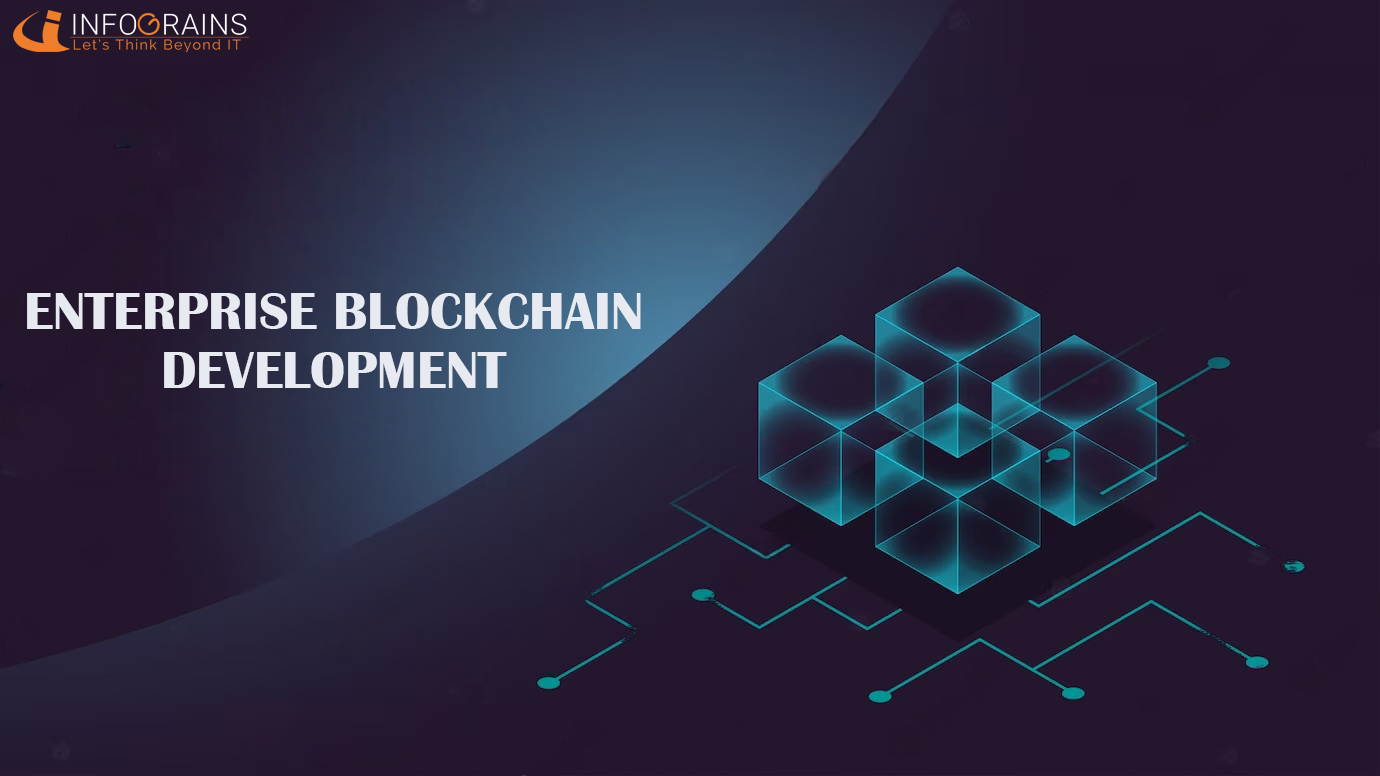- Services
- Hire Developer
- Our Products
- Insights
- Our Company
Revolutionizing Industries: Exploring the Potential of Enterprise Blockchain Development

Let's be real here. People are now becoming tired of hearing about blockchain. But with the promising long-term impact, we can't deny that blockchain is here to stay. Now that we are aware of blockchain and its usefulness in improving efficiency, reducing costs, and increasing trust, we will shed some light on enterprise blockchain development and its future.
We have seen organizations and enterprises investing in this technology. The global corporate blockchain market is anticipated to be worth USD 246 billion by 2030, growing at a CAGR of 54.5% between 2022 and 2030.
The financial services industry is the largest user of enterprise blockchain, accounting for 30% of the market in 2022.
What is Enterprise Blockchain Development?
Enterprise blockchain development is the process of developing a permissioned network to scale up commercial procedures. Only a selected group of people can access the network. Organizations/businesses have total control over the users. Corporations believe this type suits their objectives better than public blockchain since it limits who may see their data. Some of the world's largest companies have already developed solutions using enterprise blockchain development. Walmart uses blockchain to track the movement of goods through its supply chain to ensure that food is safe and that products are not counterfeit. Evernym used blockchain to create a secure and private identity management system to protect people's personal information and prevent fraud.
Need For Enterprise Blockchain Development
Throughput: Throughput time is the amount it takes to complete a transaction. In enterprises, throughput time can be a bottleneck affecting efficiency and costs. Organizations can significantly lower their throughput time by implementing enterprise blockchain development as a solution. A well-known example would be the finance industry, where blockchain can process payments and transactions providing a faster and more efficient way.
Streamlining Processes: Blockchain can automate time-consuming processes. Smart contracts can automate workflows, reduce manual errors and facilitate faster transactions. Blockchain will also be helpful in dispute resolution.
Need for collaboration: Sometimes, there is a need for collaboration between organizations to facilitate real-time data sharing, duplications, and reconciliations.Enterprise blockchain developmentenables collaboration between multiple stakeholders by providing a decentralized data structure.
Democratization: Blockchain can lead to the democratization of various industries. It can disrupt traditional processes by providing peer-to-peer transactions and decentralized governance models, leading to inclusivity, empowerment of employees, reduction in dependency on centralized entities, and ultimately democratization. However, democratization comes with challenges. The most common challenge is compliance. Democratization can make it difficult for enterprises to comply with regulations. Blockchain can help to automate the process of tracking and reporting compliance data.
Operational Costs: Saving operational costs is one of the most crucial factors for any organization, regardless of revenue size. Businesses desire to work with a budget that is not only minimal but also predictable. It is critical blockchain incorporated applications run on a cost-effective infrastructure with steady, predictable transaction costs.
.
The requirement set we just mentioned has generated so much demand that the blockchain industry has responded by developing Private and Permissioned blockchain systems designed around these enterprise requirements and expectations.
Challenges To the Adoption of Enterprise Blockchain
Costs Involved: Though blockchain networks can reduce significant costs, setting the infrastructure can be expensive. Blockchain technology is still nascent. Hiring the right talent involves high expenditure since there are limited skilled developers.
Lack of Knowledge: There is still confusion about blockchain's synonymity with Bitcoin and Cryptocurrencies. The awareness regarding enterprise blockchain development is minimal. Adding to the list are fraudulent activities associated with cryptocurrencies that create a negative image of blockchain.
Scalability Concerns: Enterprise blockchain platforms should support a large number of users without compromising the number of transactions. Due to the limited number of implementations, the scalability of blockchain networks is also limited.
Legacy System Integration: Legacy Systems hinder the adoption of blockchain technology. To opt for enterprise blockchain development, organizations must rebuild their systems or devise a practical strategy to link technologies.
The Future Ahead
Enterprise blockchain development can transform major industries in the future. We can expect increased adoption as blockchain technology matures. Enterprise collaboration or consortia will drive innovation and industry-specific solutions. Enterprises will seek solutions that allow them to leverage multiple blockchains and connect their internal systems seamlessly.
 info@infograins.com
info@infograins.com




















